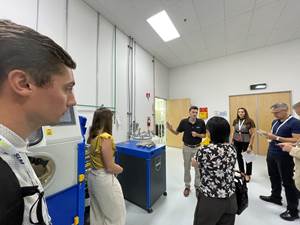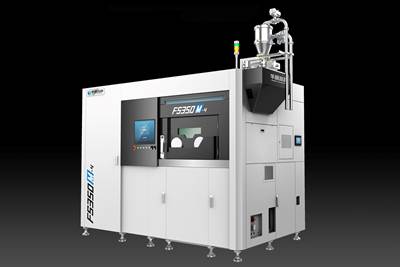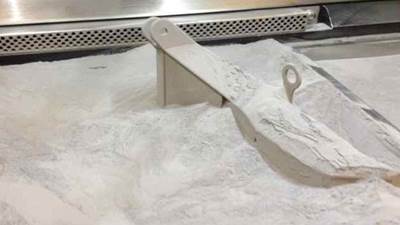Formnext Start-up Challenge 2021 Announces Winners
Winners of the Formnext Start-up Challenge 2021 impress judges with atomic precision, glass 3D printing and medical applications.
Formnext Start-Up Challenge winners will receive their awards on Tuesday, November 16, 2021, on Formnext's AM4U stage.
For the seventh time, the international Formnext Start-up Challenge is recognizing young enterprises from the world of additive manufacturing (AM) for innovative business ideas and technical developments. In 2021, the winning innovations range from nano and glass 3D printing to new medical solutions for spine patients. The 2021 winners include Atlant 3D Nanosystems ApS (Denmark), Azul 3D (USA), Fited (USA), Print Parts (USA) and Nobula AB Sweden). This year, the AM Ventures Impact Award honoree is Vispala Technologies (India). The official award ceremony is set to take place on Tuesday, November 16, 2021, on Formnext's AM4U stage.
In 2021, the winners boast numerous patents — some already awarded and some still pending — and promising applications. In some cases, over €50 million have already been poured into the young enterprises’ developments. Challenge organizers say these technical developments promise greater precision for 3D printing and considerably faster production or new applications, for example in medicine and aerospace.
The Formnext Start-up Challenge 2021 recognizes companies that are no more than five years old. The competition evaluates new and viable business ideas with a panel of judges representing industry, science, media and investment. The international winners will present their award-winning products during Formnext in Frankfurt, Germany, Nov. 16-19, 2021, and exhibit them in the Start-up Area.
AM Ventures Impact Award 2021
The AM Ventures Impact Award was presented for the second time as part of the Formnext Start-up Challenge. It honors sustainable approaches with a positive impact on environmental protection or social aspects, for example. Vispala Technologies was the winning entry with its use of 3D printing to provide affordable, highly functional and aesthetically appealing prosthetics. What is special about the project is that the company concentrates on people in developing countries and rural areas who up to now have had no access to such products.
Winners
The Danish startup Atlant 3D Nanosystems specializes in the prototyping and manufacturing of micro- and nanocomponents using multiple materials and atomic precision. The Nanofabricator platforms are advanced manufacturing systems for R&D, prototyping and manufacturing which can simultaneously process up to six materials on substrates with different morphologies and up to 300 mm in size. The company developed the Nanofabricator LiteTM in accordance with strict NASA specifications and will test the system with NASA in the next few months to enable microfabrication in micro- or zero gravity.
U.S. start-up Azul 3D developed High Area Rapid Printing (HARP) technology, which uses flowing oil between light-driven resin and the UV source to enable faster, non-adhesive 3D printing, thus enabling a significant speed increase. Azul 3D promises to combine fine details and excellent surfaces for SLA printing with an ultra-fast print time and large print volume, the company says.
Fited developed a new solution for treating spinal deformities utilizing the same principle already applied to dental braces: custom design and 3D printing — Invisalign for the spine. The aim is to replace expensive, time-consuming handmade scoliosis braces, which may be uncomfortable and inaccurate, and frequently require wearers have to undergo surgery. Fited’s solution is based on an automatic design and is said to deliver elegant, 3D printed braces within a short period of time. It is expected that these new braces will eliminate the need for surgery in 72% of the cases. Fited braces are also breathable, custom-made and light.
U.S. start-up Print Parts Inc. developed a digital signature embedded in parts produced by AM which makes components scannable, serialized and cloud-connected. The platform combines management, authentication and tracing of 3D printed parts. Programmable nanoparticles are embedded in additive materials or subsequently added to the components. Smart scanners can detect and register particles in these “SmartParts,” while component histories are stored on the SmartParts platform and managed by build manager or an existing MES/ERP system.
Swedish startup Nobula AB has developed a desktop glass 3D printer that aims to be less costly and more versatile than existing solutions. The company has filed for two patents, one for the glass 3D printer and another for the printing material technology, which will enable Nobula AB to provide custom glass 3D printing for science, development and production.
Related Content
The AM Ecosystem, User Journeys and More from Formnext Forum Austin: AM Radio #43
Sessions and conversations at the first U.S. Formnext event highlighted the complete additive manufacturing ecosystem, sustainability, the importance of customer education, AM user journeys and much more.
Read MoreTrinkle Additive App Suite Features Collection of Accessible, Intuitive Design Apps
Formnext 2024: The Additive App Suite builds on the success of the company’s fixturemate — a user-friendly design app for creating fixtures. The software includes three new apps with more to come.
Read MoreMoldJet Technology Enables High-Throughput Metal, Ceramic Additive Manufacturing
Formnext 2023: Tritone Technologies’ additive manufacturing solutions enable industrial throughput of accurate parts with a range of metal and ceramic materials.
Read More8 Cool Parts From Formnext 2024: The Cool Parts Show #78
End-use parts found at Formnext this year address various aspects of additive's advance, notably AM winning on cost against established processes.
Read MoreRead Next
Bike Manufacturer Uses Additive Manufacturing to Create Lighter, More Complex, Customized Parts
Titanium bike frame manufacturer Hanglun Technology mixes precision casting with 3D printing to create bikes that offer increased speed and reduced turbulence during long-distance rides, offering a smoother, faster and more efficient cycling experience.
Read MorePostprocessing Steps and Costs for Metal 3D Printing
When your metal part is done 3D printing, you just pull it out of the machine and start using it, right? Not exactly.
Read More3D Printed Polymer EOAT Increases Safety of Cobots
Contract manufacturer Anubis 3D applies polymer 3D printing processes to manufacture cobot tooling that is lightweight, smooth and safer for human interaction.
Read More




















